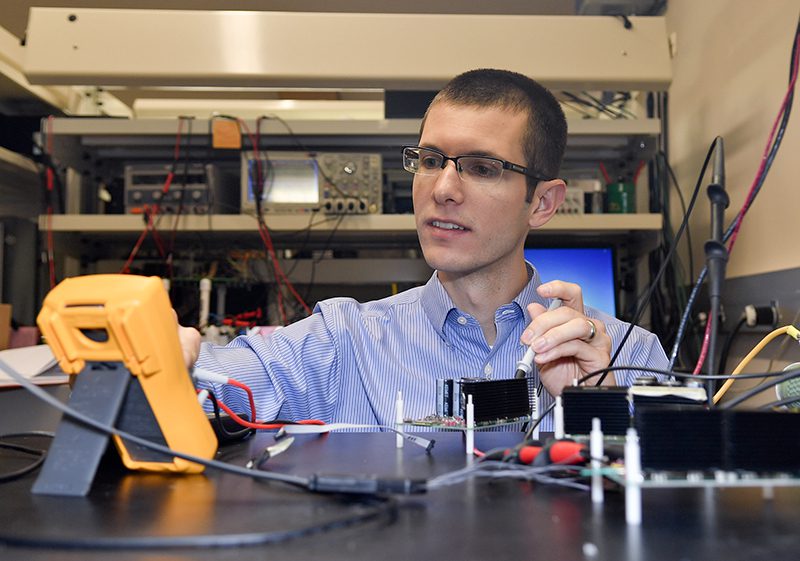PhD Degree Requirements

It is the student’s responsibility to understand and meet the degree requirements for their Ph.D. degree, as described below:
The following is a chronologically ordered set of steps for completing the Ph.D. in Electrical Engineering:
- Identify a Ph.D. advisor, by the end of the first semester after admission.
- Form an advisory committee and develop a Ph.D. Plan of Study, detailing a plan for completing the requirements for the Ph.D. degree, by the end of the second semester after admission.
- Successfully complete the Breadth part of the qualifying examination, which must be done by the end of the second semester after admission.
- Consult with the advisory committee about the contents of the Depth part of the qualifying examination and successfully complete it, which must be done by the end of the semester following the semester when the breadth exam was completed.
- Present the Ph.D. research proposal and submit the admission to candidacy.
- Present and defend the Ph.D. dissertation to the advisory committee.
Credit Requirements
The Ph.D. degree requires successful completion of at least 72 approved graduate credits beyond the Baccalaureate degree. Of these, the student may include up to 30 approved credits from those taken during the student’s Masters’ degree, which may have been taken at some other university. However, the student should have them approved by submitting a Transfer of Credit form prior to entering them in the Plan of Study. At least 12 credits must comprise of courses in ECE taken after the student joins the Ph.D. program. In addition, the student must take at least 18 dissertation credits. The student should consult his/her advisor to determine the courses to be taken and included in the Plan of Study.
All doctoral students must register for 8000 level courses when they are available. 6000 and 5000 level courses that do not have 8000 level counterparts may also be counted towards the doctoral degree if approved by the advisory committee.
Grades
A student must have a GPA of at least a 3.0 in order to graduate. The dissertation is graded on a Pass/No Credit basis and, therefore, will not be included in the cumulative average. An accumulation of more than two marginal (C) grades will result in suspension of the student’s enrollment in the graduate program. If a student makes a grade of U on any course, enrollment will be suspended. A graduate student whose enrollment has been suspended because of grades is ineligible to attend any semester or summer session unless properly readmitted to the graduate program. Readmission to the program requires approval of the Dean of the Graduate School upon the recommendation of the student’s major department.
Program Committee
A Ph.D. advisory committee consists of at least four graduate faculty members, including the primary advisor. The primary advisor must be a graduate faculty member of ECE. The graduate student chooses the advisor and at least two other members of the committee in consultation with his/her advisor, which must be entered in the Plan of Study. The Graduate School selects the fourth member, who is external from the student’s department, and informs the student about it at the time the Plan of Study is formally approved. The primary program advisor generally serves as the chair of the committee.
Qualifying Examination
In addition to demonstrating a high level of competence in course work, the student must pass the Ph.D. qualifying examinations. The qualifying examination should be taken before completion of 18 hours beyond the master’s degree but must be passed no later than three semesters after initial admission to the program. Failure to pass the qualifying examination in two tries will result in the termination of the student’s enrollment in the Ph.D. program.
Residence
A student may satisfy the residency requirement for the program by completing 18 hours, either course work or research credits, by study-in-residence during the academic year and during the summer terms, as long as the study is continuous. Study-in-residence is deemed to be continuous if the student is enrolled in one or more courses (including research/dissertation credit) in successive semesters until eighteen hours of credit are earned.
Dissertation Proposal and Admission to Candidacy
Because the Ph.D. program is heavily based on independent research, each student must write a proposal describing his/her proposed dissertation research following the technical guidelines established by the department. The proposal must be presented to and orally defended before the student’s advisory committee. The proposal must be presented within one year after the qualifying examination is passed. Upon approval of the student’s dissertation proposal, the advisory committee will recommend the student’s admission to candidacy subject to the approval of the engineering Doctoral Graduate Committee and the Dean of the Graduate School.
Dissertation
Evidence of a high degree of competence in scholarship, written exposition, independent inquiry and the ability to organize and apply knowledge must be demonstrated by the student in the dissertation. The student will make a public defense of the dissertation at which time the dissertation, as well as the student’s knowledge of the field, will be appropriate matter for examination by the student’s advisory committee. Although questions may be asked by the general audience, evaluation of the dissertation defense is the sole responsibility of the advisory committee. The dissertation will be graded on a Pass/Unsatisfactory basis.
Time Limit
Students are allowed a maximum of eight (8) calendar years from formal admission to the Ph.D. program to complete the program successfully.